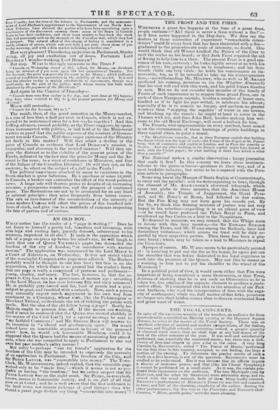AN OLD BOY.
WHAT notion has the reader of a "page in waiting ?" Does he not fancy to himself a pretty lad, beardless and blooming, with slim legs and curling hair, jauntily dressed, subservient to his mistress, impudent to all else ? If such is the apparition which talk of a page conjures up before his mind's eye, he will laugh to learn that one of Queen VICTORIA'S pages has demanded the freedom of the city of London, " in accordance with ancient custom." The application was announced by the Lord Mayor to a Court of Aldermen, on Wednesday. It was not stated which of the worshipful Companies the page most affected. The Barbers probably would be thought to suit him best ; but this is on the supposition, fur which there is no ground but the reader's fancy, that our page is really a compound of pertness and perfumery— young, slender, and saucy. The fact, however, is, that the as- pirant to City how ors is a gentleman of mature age : according to the Lord Mayor, he has seen between fifty and sixty summers! He is probably grey-haired and fat, fond of punch and a pipe, subject to gout, and troubled with a catarrh. Now, such a person may rationally expect much enjoyment in his own way from enrolment in a Company, whose cock, like the Fishmongers' or Merchant Tailors', understands the art of tickling the palate with turtle. But the idea of the old fellow being a page! Really her Majesty ought to pension him off. if the means are wanting, (and it must be confessed that tlie Queen was treated shabbily in the matter of the Civil List 1) let a special message be sent to "my faithful Commons ;' and Mr. SPRING RICE will answer for its reception in "a liberal and gentlemanly spirit." He would indeed have an irresistible argument in favour of the proposed grant • how, he would ask honourable Members, could it be supposed that the Queen had the means of pensioning her attend• ants, when she was compelled to apply to Parliament to eke out even her poor mother's paltry income ? But softly !—perhaps "our fat friend's" application for the freedom of the City may be intended to supersede the necessity of an application to Parliament. The freedom of the City, said Sir PETER LAURIE, was "convertible into matey." The Town- Clerk, Mr. WOODTHORPE, indeed replied, that the venerable page wished only to be "made free,"—which it seems is not so pro- fitable as having "the freedom ;" but we rather suspect that Sir PETER LAURIE was on the right scent. Sir PETER, as everybody knows, moves in fashionable society, and is au fait of all that goes on at Court; and he is well aware that the first noblemen in the land scorn not minute pickings of good things : then why should a passe page disdain any thing "convertible into money"?


























 Previous page
Previous page